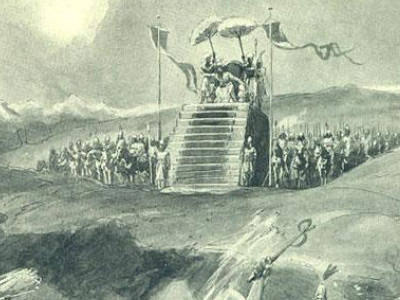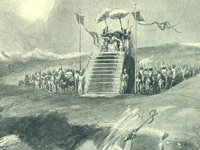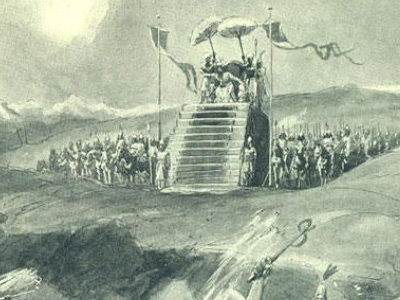Battle of Mycale (479 BC)

The Battle of Mycale (Ancient Greek: Μάχη τῆς Μυκάλης; Machē tēs Mykalēs) was one of the two major battles that ended the second Persian invasion of Greece during the Greco-Persian Wars. It took place on or about August 27, 479 BC on the slopes of Mount Mycale, on the coast of Ionia, opposite the island of Samos. The battle was fought between an alliance of the Greek city-states, including Sparta, Athens and Corinth, and the Persian Empire of Xerxes I.
The previous year, the Persian invasion force, led by Xerxes himself, had scored victories at the battles of Thermopylae and Artemisium, and conquered Thessaly, Boeotia and Attica; however, at the ensuing Battle of Salamis, the allied Greek navies had won an unlikely victory, and therefore prevented the conquest of the Peloponnese. Xerxes then retreated, leaving his general Mardonius with a substantial army to finish off the Greeks the following year.
In the summer of 479 BC, the Greeks assembled a huge army (by contemporary standards), and marched to confront Mardonius at the Battle of Plataea. At the same time, the allied fleet sailed to Samos, where the demoralised remnants of the Persian navy were based. The Persians, seeking to avoid a battle, beached their fleet below the slopes of Mycale, and, with the support of a Persian army group, built a palisaded camp. The Greek commander Leotychides decided to attack the Persians anyway, landing the fleet's complement of marines to do so.
Although the Persian forces put up stout resistance, the heavily armoured Greek hoplites again proved themselves superior in combat, and eventually routed the Persian troops, who fled to their camp. The Ionian Greek contingents in the Persian army defected, and the camp was assailed and a large number of Persians slaughtered. The Persian ships were then captured and burned. The complete destruction of the Persian navy, along with the destruction of Mardonius's army at Plataea (allegedly on the same day as the Battle of Mycale), decisively ended the invasion of Greece. After Plataea and Mycale, the allied Greeks would take the offensive against the Persians, marking a new phase of the Greco-Persian Wars. Although Mycale was in every sense a decisive victory, it does not seem to have been attributed the same significance (even at the time) as, for example the Athenian victory at the Battle of Marathon or even the Greek defeat at Thermopylae.
HISTORY

RESOURCES
This article uses material from the Wikipedia article "Battle of Mycale (479 BC)", which is released under the Creative Commons Attribution-Share-Alike License 3.0.
© Stories Preschool. All Rights Reserved.










